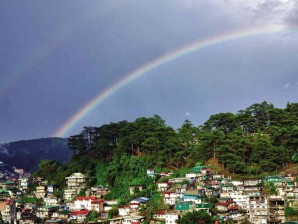
BAGUIO has been feeling the heat much like the rest of the country, with temperatures rising as high as 26.8 degree Celsius. EV ESPIRITU/INQUIRER NORTHERN LUZON
BAGUIO CITY—Summer has become uncomfortable for residents here, with temperatures rising to close to 30 degrees Celsius in the last two weeks, just as lowland provinces experience even hotter temperatures at 40 degrees Celsius.
Efren Dalipog, Baguio weather observer, said the hottest day in Baguio in the last 99 years was on May 15, 1988 when the temperature reached 30.4 degrees Celsius. The hottest day in the city since 2000 was recorded on April 12, 2010 at 30 degrees Celsius.
Many tourists who arrived here for the Holy Week break toured the city without sweaters and jackets. On March 28, Holy Thursday, the temperature reached 27.4 degrees Celsius, followed by a comparatively cooler 24.8 degrees on Good Friday.
Brief afternoon rains
Subsequent days recorded a steady 27 degrees, peaking at 29.2 degrees on April 5.
On Wednesday, the temperature was 26.8 degrees Celsius. The heat, however, became bearable due to brief rains in the afternoon.
Many experts said rising temperatures attributed to climate change should not change the equation: Baguio will remain the coolest city in the Philippines.
Gradual rise in temperature
Various agencies like the Department of Health and the Department of Environment and Natural Resources have recorded a gradual rise in Baguio temperature since the 1980s.
What drew their attention was the presence of tropical insects and diseases (known to thrive in hot weather) in the mountain city in the last decades of the 20th century, records showed.
In the 2011 book, “Crop Adaptation to Climate Change,” scientists detected shifts in Southeast Asian weather, observing that in Baguio, “the frequency of hot nights and warm days exhibited significant increases, with a significant decrease in cool days.”
The book’s authors are Shyam Singh Yadav, Robert Redden, Jerry L. Hatfield, Hermann Lotze-Campen and Anthony J. W. Hal. Reports from Vincent Cabreza and Gobleth Moulic, Inquirer Northern Luzon